Shows exploring familial bonds are having huge success globally right now, with the likes of The Bear and The Last Of Us racking up awards and viewers. Sherlock & Daughter creator Brendan Foley examines what makes these stories so compelling
Fathers and daughters, mothers and sons, sibling rivalries and brotherly bonds have been at the heart of drama since cave dwellers first put words to their handprints on cave walls. And something in those eternal family dynamics seems to be touching a new nerve with today’s audiences.
Yet anyone who thinks it is a simple task to plug family formula into the zeitgeist for critical or commercial success should tread warily. The inter-generational story landscape of TV drama is littered with misses as well as hits.
The earliest written stories often involved troublesome offspring. Adam and Eve were barely over their own snake issues when forced to deal with jealous sons. Cain, a farmer, and Abel, a shepherd, were the first case of drama fratricide, with God acting as the motive – favouritism – and as chief investigator. These stories run deep because the primal relationships of every generation are about how each imitates or differs from the next.
Fast-forward several thousand years and Shakespeare was wresting with parent-offspring dynamics, from Hamlet’s rage at his disloyal mother to his ire at himself for dicking around instead of avenging his dad. Or Lear, where a father’s vanity and poor judgement lead to him disowning the wrong daughter.
Leap forward a few centuries and Dickens, ever the innovator, explores father-son relationships not by blood but through shared struggles. In Great Expectations, Pip is an orphan with a kind surrogate father in Joe Gargery, and a criminal would-be father figure in Magwitch. As Pip grapples with becoming his own man, he has regrets about how he has treated both of them, explored most recently in Steven Knight’s 2023 BBC version.
Family dynamics
Hopping over father-son milestones like The Godfather and Ordinary People, the previous explosion of wayward TV parents and offspring emerged during the golden age of drama, kicked off by HBO’s The Sopranos, with a dysfunctional mob boss dad in therapy and his appalling yet appealing progeny, and his parallel surrogate crime family.
Then, in short order, there was The Americans, with parents concealing their spy status from son and daughter, and Walter White in Breaking Bad, a man who lost both his true son and his surrogate son Jesse Pinkman because of his own Napoleonic tendencies.
Now in the mid 2020s, a raft of popular shows concentrate on parents dealing with offspring coming of age, while offspring deal with the need for both acceptance by – and independence from – a parent. Recent shows that rely on a parent-offspring dynamic have touched an international nerve.
Succession was arguably the first of the current wave, aided by being at the nexus of two currently popular themes: parent-offspring tensions and the lives of the fascinatingly fucked-up super-rich. It emerged on HBO when anti-heroes were supposedly going out of vogue, yet audiences could not get enough of evil old spider Logan Roy and his fractious, fractured children as they schemed for their inheritance.
“The Last Of Us is one of the greatest and most successful father-daughter dynamics in which the pair are not related by blood”
The Assassin has been a success for Amazon Prime Video with a simple but powerful central proposition of an ex hit-woman mother and her innocent estranged son trying to get to know each other while running for their lives together as her murderous past catches up with them.
It reverses previous generations of stories about exasperated parents with troublesome teens. In this case, a somewhat straightlaced son is faced with a sweary former assassin mother as they try to reset their relationship.
The Last Of Us is one of the greatest and most successful father-daughter dynamics in which the pair are not related by blood. Starting with an emotionally deadened smuggler and a prickly teen who is little more to him than a package for delivery across a dystopian post-apocalyptic land, the pair evolve into the roles of surrogate father and a daughter longing for recognition, thirsty for knowledge of a world she has never seen.
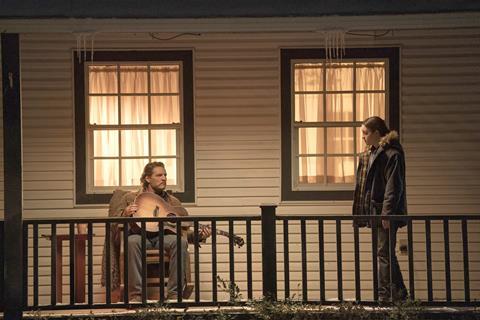
While part of its meteoric success is down to outstanding, innovative writing about age-old relationships, the scripts in turn attract the greatest acting talent – in this case, Pedro Pascal and Bella Ramsey.
Sherlock & Daughter was, luckily for me and my colleagues, one of the biggest breakout hits of the year on The CW, HBO Max, SBS and others. But when I was developing it with showrunner James Duff, our focus was simple: keep two audiences on board and equally engaged.
As an older Sherlock, played by David Thewlis, grapples with a choice between risking the lives of his closest companions or being unable to investigate a series of crimes, a young American woman, played by Blu Hunt, lands in Baker Street like a meteorite, claiming to be his daughter. She is youthful, smart and sometimes over-confident in a world that welcomes none of that from someone of her age and station.
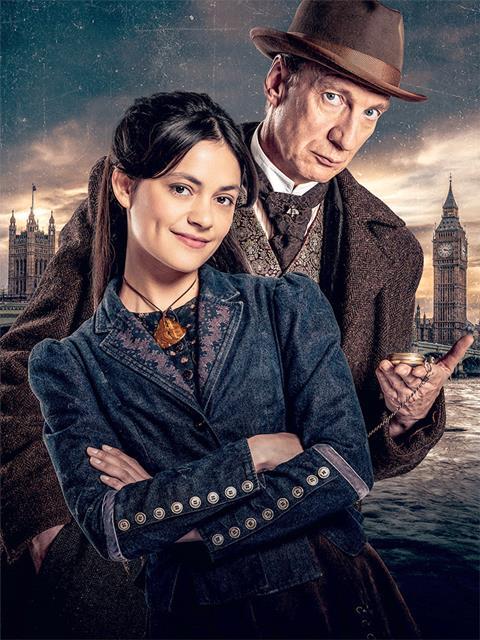
As the pair dance between needing each other to crack crimes, to caring about each other while remaining mutually exasperated, the core of the story becomes clear. Beyond the Holmesian mystery, they are father and daughter, whether by blood or by brains. It is that very human dynamic that seems to be at the root of its success.
Adolescence could have been a soapy English melodrama. Instead, thanks to its relatable father-son dynamic, great writing and powerhouse performances, the Netflix show took off like a rocket and became a multiple Emmy winner, causing debates about the challenges facing working-class boys and their parents.
Cleverly lurking beneath the clothes of a crime show, it asked questions about how parents could be unaware of their boy’s spiral into rage and mental illness.
As with some of the other successes, the show refused to take the easy way out with stock characters, digging out both the decency and damage behind each of them.
Once again, fine writing attracted great acting talent, including Stephen Graham and young Owen Cooper. The scenes of father and son trying to reach out across the abyss of understanding between them and their generations provided some of the most powerful TV of recent years, and the show was rewarded with a slew of Emmys.
The Bear is all about family. The most recent season of the FX/Hulu hit explored the relationship between a damaged son and an even more damaged mother, portrayed by Jeremy Allen White and Jamie Lee Curtis. Every character has their own family shadow to deal with, but most of the optimism comes from their unity as a family-by-choice at the restaurant.
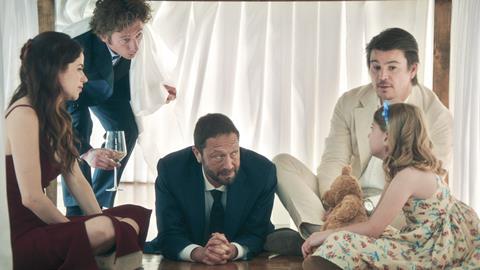
One of the most talked-about scenes of the season was divorced dad Richie (Ebon Moss-Bachrach) connecting with his daughter while hiding under a table at his ex’s wedding reception as other adults joined them, one at a time.
Yet not every show exploring inter-generation family themes finds it easy to connect with an audience, even with good material. ITV’s Out There, despite talented writers and the always-magnetic Martin Clunes waving a shotgun, did not get the traction needed for a second season. Clunes portrays a widower farmer trying to protect his fragile son from a county lines drug gang that is slowly engulfing a troubled rural community.
Similarly, 5’s The Inheritance, despite solid on-screen talent, got mixed reviews as it mined the traditional material of family inheritance betrayal and bickering offspring following the questionable departure of a patriarch and a new femme fatale getting all the goodies from a changed will.
Hits and misses
Anyone who claims they can identify why something is a hit while an apparently close cousin is a miss should be in the fairground fortune-telling business rather than TV drama, but I will hazard a few thoughts.
Many international audiences are used to their family stories being delivered in soapy form or telenovelas, where the long-running formats suit the endless to and fro of family relationships. Both Out There and The Inheritance have more localised and traditional storylines.
Out There’s rural drug crime world of Welsh county lines felt to some viewers less compelling than the related world of drugs and money laundering in Ozark. And The Inheritance definitely had the feel of more standard UK cop fare than the Shakespearian sweep of Succession. Yet The Inheritance did gain a second audience when it moved to Netflix, so the power of an inter-generational engine should never be written off.
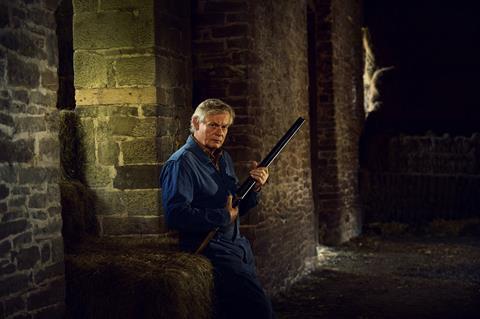
Whatever the ups and downs, success is not just about scale, as Adolescence proved with its laser-like focus on a few moments of time inside one small, realistic family. But from the subject matter to the shoot, dialogue to acting, it was utterly fresh and as far from predictable family genre fare as one can get.
Looking beyond immediate ups and downs, perhaps the last big question is whether parentoffspring stories’ recent renaissance is just part of the never-ending desire to grapple with that most basic unit of drama – the family. Or perhaps there is something in our own peculiar times that accounts for the new wave.
Part of the answer has to be that the definition of family has changed so much in 40 years. While numbers differ in different countries, the international trend is clear: fewer married couples, fewer children per couple, more cohabitation, more divorce, more single-parent families, more blended families.
The humans behind these demographic shifts want to see people that reflect them and, perhaps more tellingly, shows that reflect their struggles to connect.
Social media and its advertising engine have sliced and diced our audiences, generations and genres to such an extent that humans are hungry for stories that reach across the age and experience divide between parents and offspring.
The yearning for recognition from parents and the parental desire for offspring to grow up as safe, happy and decent humans are urges so baked into our humanity that even being herded in opposite directions by AI, algorithms or audience segmentation is no match for human connection.
One thing is for sure: today, a father saying, “Because I said so” is the opening shot of a great story, not a full stop – even if the parent is Sherlock Holmes.
Sherlock & Daughter debuted on The CW, HBO Max US, SBS (Australia) and the Nordic public broadcasters over summer 2025


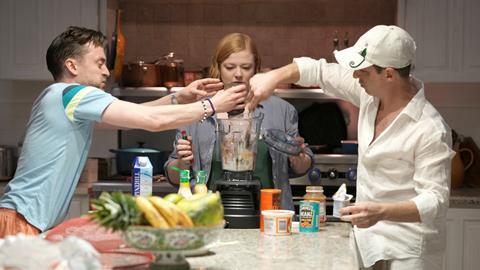





![Cristal + Viivi[1]](https://d11p0alxbet5ud.cloudfront.net/Pictures/100x67/1/2/6/1470126_cristalviivi1_399326_crop.jpeg)
No comments yet